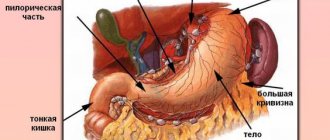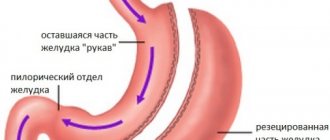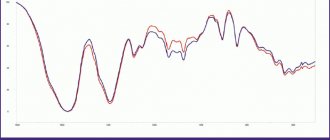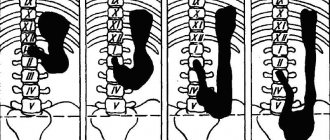Gastritis is an inflammation of the gastric mucosa, often leading to complications that require surgical treatment. The disease is common in all age groups and is closely related to the characteristics and quality of nutrition. Stomach pain with gastritis can be so intense that hospitalization is recommended for the patient. Inpatient treatment of the disease is often required for children and adolescents, as well as adults with ulcerative gastritis and concomitant gastrointestinal diseases.
Causes and forms of gastritis
The main cause of gastritis is infection: in more than 80% of patients with signs of stomach inflammation, Helicobacter Pylori is detected. This gram-negative bacterium can infect different parts of the stomach and duodenum, including causing ulcerative lesions of the mucous membrane. Experts have concluded that this microorganism has a significant impact on the development of infections of the stomach and other parts of the gastrointestinal tract. This discovery allowed significant progress in the treatment of acute and chronic gastritis, starting the use of antibiotics.
Other possible causes of gastritis:
- Errors in nutrition. With constant contact of the gastric mucosa with spicy, fatty, thermally irritating foods and drinks, a natural inflammatory reaction occurs. Also, frequent exacerbation of gastritis can be associated with long intervals between meals, during which the surface epithelium is damaged by gastric juice.
- Concomitant diseases of the digestive system. The stomach is part of the digestive system. It is closely related to the work of other organs. Most often, gastritis progresses against the background of reflux disease, biliary dyskinesia, chronic duodenitis, and cholelithiasis.
- Negative impact of stress factors. Chronic exposure to stress is accompanied by vasospasm and associated circulatory disorders in the mucous membrane of the digestive system. These pathological changes can cause chronic gastritis, which is prone to relapse due to nervous stress and anxiety.
- Chemical effects on the gastric mucosa. Occurs due to an aggressive effect on the epithelium of the gastrointestinal tract. A similar reaction can also be triggered by medications, especially non-steroidal anti-inflammatory drugs and hormones.
- Alcohol abuse, smoking and other bad habits. In general, an unhealthy lifestyle is a predisposing factor to inflammation of the gastric mucosa and changes in the main indicators of gastric juice.
Rare causes of gastritis include radiation therapy for malignant diseases of the gastrointestinal tract. An acute inflammatory process may occur as a result of mechanical damage to the mucous membrane during gastroscopy and other studies.
Experts classify gastritis depending on the form of the disease (acute, chronic) and etiological factors. According to the degree of spread of the inflammatory process, gastritis can be of the following types: catarrhal, fibrinous, phlegmonous, erosive.
Increased stomach acidity
21.04.2021
Increased stomach is a very unpleasant disease of the digestive system. This is a condition of excessive acid secretion that irritates the stomach and causes a number of unpleasant symptoms. It causes, among other things, abdominal , heartburn , flatulence, constipation or a burning sensation in the chest .
There are many causes of high acidity, the most common of which is an unhealthy and irregular diet based on foods that are difficult to digest. Treatment involves taking acid-blocking medications, but changing your eating habits is equally important. Proven home remedies such as drinking flaxseed, ginger or potato juice or chewing juniper seeds can also help relieve the symptoms of acidosis. So how to deal with excess gastric juice? What diet should you follow and what foods should you avoid?
Causes of high stomach acidity
Hyperacidity (adiosis) of the stomach occurs due to excessive production of hydrochloric acid in the gastric juice, which changes the pH of the digestive system to be more acidic.
Hydrochloric acid is essential for digesting food, but it is corrosive. gastric mucosa neutralizes the effect of this acid, but if it is damaged ( reflux , peptic ulcer ), it does not perform its functions, and excess gastric juice creates unpleasant symptoms.
stomach acidity is poor diet. Increased secretion of gastric juice is stimulated by difficult-to-digest foods, especially when carbohydrates are combined with proteins and fats. Very sour or very spicy foods also cause hyperacidity. This condition is also affected by irregular eating, hasty eating, overeating or fasting. Stimulants: alcohol, cigarettes and coffee also contribute to an increase in the amount of hydrochloric acid. It could also be a reaction to stress or taking certain medications, such as aspirin.
Symptoms of high stomach acidity
An imbalance in the acid balance in the body causes very unpleasant symptoms. Primarily, this is pain in the upper abdomen due to irritation of the gastric , which occurs several hours after eating. Accompanied by nausea , vomiting, gas , indigestion. You may also experience heartburn , which is a burning pain in the esophagus when acidic food returns to the digestive system. You may also experience a burning pain behind the breastbone, acid belching , and a feeling of irritation and fatigue.
How to treat high acidity?
Treatment for hyperacidity of the stomach mainly involves changes in diet and the use of pharmacological agents to relieve symptoms. For this purpose, proton pump inhibitors are used to suppress the secretion of hydrochloric acid. H2 blockers are also used to suppress histamine-dependent gastric acid production. Sometimes antacids are also taken. These products are effective and relatively safe, but you should consult your doctor to determine the appropriate medications.
Diet for high acidity
Proper diet plays a very important role in treating high stomach . This is the easiest way to reduce the secretion of hydrochloric acid and get rid of ailments. It will also help speed up the healing of gastrointestinal ulcers and improve your quality of life. You should exclude from the menu foods that increase the production of digestive juices, that is, hard-to-digest and spicy foods, fatty meats, sweets, high-carbohydrate flour products and legumes.
You should also avoid alcohol, coffee and strong tea. However, you can eat vegetables, fruits, lean meats, fish and low-fat dairy products. You should also not combine starchy and protein foods in one meal. You need to eat regularly, at least 5 times a day. Products are best steamed or stewed; frying should be avoided. Before eating, you should grind the food and chew it thoroughly while eating. It is also important not to overeat, but also not to make you feel hungry.
Published in Gastroentorology Premium Clinic
Symptoms of gastritis
The main symptom of gastritis is pain in the stomach. It can be caused by errors in nutrition, exposure to thermal, chemical and mechanical factors. Stomach pain is accompanied by nausea, vomiting, and loss of appetite. Weakness and dizziness may appear, which is typical for ulcerative gastritis, which is accompanied by the appearance of erosions and can cause bleeding and other life-threatening disorders.
Symptoms of chronic gastritis depend mainly on the acidity of gastric juice. If it is elevated, the patient is bothered by pain in the epigastric region, which appears 10-20 minutes after eating. Additionally, signs of gastritis such as nausea and sour belching appear.
In patients with insufficient production of hydrochloric acid and a decrease in the acidity of gastric juice, pain with gastritis is mild, characteristic mainly of the acute period. Nausea appears in the morning. Also, chronic gastritis with low acidity is characterized by rapid saturation. Patients often experience a feeling of heaviness in the abdomen combined with flatulence, belching of air and a bitter taste in the mouth.
How to prepare for tests
Urine and stool tests . The biomaterial is collected in a special sterile container (purchased at the pharmacy). The day before, it is not recommended to take multivitamins and eat foods that can change the color of the biomaterial, as well as laxatives and diuretics.
Urine is collected in the morning, after careful hygiene of the external genitalia. It is necessary to drain the first dose of urine into the toilet, and collect the middle portion (100-150 ml) in a container.
Feces are collected in the morning or no later than 8 hours before the test.
Gastropanel . A week before the study, you should stop taking medications that can affect gastric secretion. The day before, avoid taking medications that neutralize hydrochloric acid. On the morning of the test, do not drink, eat, or smoke.
The study involves donating blood from a vein in two doses: immediately upon arrival at the treatment room and 20 minutes after taking a special cocktail designed to stimulate the hormone gastrin 17.
Blood tests (general, biochemical) . Blood for testing is donated in the morning on an empty stomach. On the eve of the analysis, you should avoid stress, refrain from eating heavy food and alcohol. You should not eat or smoke on the morning of the test. Drinking clean water is allowed.
PH-metry. The probe is installed in the morning on an empty stomach. At least 12 hours must pass since the last meal, and you can drink water no later than four hours before the procedure. Before the planned study, be sure to notify your doctor about the medications you are taking; their use may have to be discontinued several hours (and some medications several days) before the procedure.
It is also recommended that a few days before the study, you refrain from consuming foods that can change the pH of the stomach (we are talking about carbonated and alcoholic drinks, coffee, strong tea, fruit juices, yoghurts, etc.).
Laboratory diagnostics of stomach diseases in “MedicCity”:
- Gastropanel;
- Determination of biochemical parameters;
- Pepsinogen-I;
- Pepsinogen-II;
- Gastrin-17 basal;
- Gastrin-17 stimulated;
- IgG antibodies to Helicobacter pylori;
- PCR stool.
The multidisciplinary clinic "MedicCity" offers patients a wide range of diagnostic and treatment services. You can undergo instrumental diagnostics of stomach diseases, take tests at any convenient time by appointment, without queues and stress, in a pleasant atmosphere and at an adequate cost.
Principles of nutrition and treatment of gastritis
Treatment for gastritis is selected by a gastroenterologist or therapist based on examination data. If there are signs of inflammation of the gastric mucosa, endoscopy is prescribed. This is the main diagnostic method. If the presence of ulcerative gastritis or duodenal ulcer is suspected, radiography is prescribed. Additionally, it is necessary to conduct a breath test for Helicobacter Pylori and laboratory blood tests.
Medical tactics for symptoms of gastritis are determined by the causes of the disease. But regardless of the etiological factors, therapeutic nutrition is prescribed. If an infection is detected, gastritis is treated with antibiotics. Excessive secretion of hydrochloric acid is corrected with proton pump inhibitors and drugs of other groups. Gastroprotectors are used to protect the epithelium.
What to do if you suspect changes in acidity
If you constantly (for at least 3-4 weeks) experience one or more of the listed symptoms, you should definitely contact a gastroenterologist. In addition to the standard set of tests (blood test, stool test, ultrasound of the abdominal organs, gastroscopy), it is necessary to do a study of the acidity of the gastric contents. Intragastric pH-metry is considered the most informative method; urine staining and fractional sounding are the least informative.
– There is no need to fight stomach acidity if it is normal. After a few years, this can lead to serious illnesses. If atrophic changes have already begun, it is necessary to suppress H. Pylori with antibiotics and treat atrophy with drugs based on rebamipide. Diet is only an auxiliary, and not the main means of combating diseases of the gastrointestinal tract. It reduces symptoms, but does not cure pathological processes on its own, advises Sergei Vyalov.
Basic nutrition rules
Regardless of what purpose the specialist or patient is pressing, which will cause an increase or, conversely, a decrease in stomach acidity, it is necessary to follow several basic rules, which include the following measures:
- Changing the nature of nutrition. Meals should always be frequent and small. It is forbidden to eat large portions of foods, as the stomach becomes overstretched and the parietal cells do not produce enough acid. This causes fermentation, bloating and abdominal pain.
- It is not recommended to consume fried or smoked foods, as the carcinogens they contain increase the risk of not only acidity disorders, but also malignant processes.
- Drinking enough liquid. According to many patients, the most beneficial is water with lemon added. It leads to increased acidity, which is dangerous for patients with initially reduced acidity levels.
- Complete exclusion of alcohol-containing products from the diet. To give up smoking.
- Limiting the use of medications. It is recommended to exclude medications as much as possible if they do not affect acidity. Continuation of therapy is mandatory when their deficiency can be life-threatening.
- Elimination of stress, emotional overload and other problems with the functioning of the nervous system.
Normalizing nutrition prevents the development of high stomach acidity. In order to prevent hydrochloric acid from accumulating in the stomach cavity, it is necessary to regularly adhere to fractional meals.
Among the foods that reduce the level of hydrochloric acid are:
- Dairy products that are not fermented include milk, cottage cheese and cheese.
- Fruit and vegetable dishes.
- Low-fat boiled meats.
- Boiled lean fish.
- Whole grain porridge.
Before creating the required diet, it is imperative to consult with a specialist. Only a doctor will be able to accurately identify the cause and, based on it, choose the most suitable and missing products for the body. A prerequisite is the selection of products taking into account calorie content and nutrient composition.
If necessary, the doctor selects a medicinal drink consisting of mineral waters and other drinks. Including them in the diet without prior examination can cause serious consequences for the body.
Taking water
Water with bicarbonate will help normalize acidity
Currently, in pharmacies and stores you can find a large amount of water that is used for medicinal purposes. Among them are sulfate, alkaline, chloride and other types of drinks.
The choice depends on the type of pathology for which the patient consults a doctor. Against the background of increased acidity, which leads to gastritis and peptic ulcers, it is recommended to include water containing bicarbonates in the diet.
The use of this mineral water leads to a decrease in the level of hydrochloric acid due to the entry of its ions with bicarbonate, which is an alkaline solution. As a result of a complex chemical reaction, neutralization occurs.
In addition, bicarbonates absorbed into the internal environment come into contact with a hydrogen ion. It is these ions that are involved in the production of gastric acid. During the treatment, the patient notes an improvement in well-being, a decrease in nausea and heartburn.
Great importance is also paid to its temperature; it is recommended to use heated water, which eliminates excess carbon dioxide content. The volume of liquid drunk should be up to a liter. It must be taken before eating food, since on an empty stomach the amount of hydrochloric acid is high.
Prevention
Regarding preventive measures, one thing can be said that they all come from the causes of this problem. Thus, preventive measures include:
- Proper nutrition, eating foods rich in fiber, proteins and vitamins
- Balanced nutrition, that is, eating small portions
- Avoiding fatty and spicy foods
- Exclusion from the diet of any fast foods
- Avoiding alcoholic beverages or drinking them in reasonable quantities
- Regular examination for the presence of Helicobacter bacteria, which provokes the development of many diseases
- Avoiding stressful situations
- Timely treatment of any infectious diseases, as they can cause complications
If you nevertheless discover at least one of the above symptoms, then you should not waste time and try to cure this disease yourself. Time will be wasted, and there will be no positive result, will there be temporary relief. Only a doctor can make an accurate diagnosis based on research and prescribe treatment. It will take a long time to treat high acidity, but it is worth making every effort and completing the full course of treatment, since this gap will not disappear on its own!
A few words about serum markers
We have a diagnostic algorithm for identifying stomach diseases, which is recommended for all patients who have pain or discomfort in the upper abdomen.
Pepsinogens
There are seven isoforms of pepsin precursors, five of which are designated as group Pepsinogen I of the main cells of the stomach body and Pepsinogen II, uniformly secreted by the glands of the entire stomach and duodenum. Pepsinogens formed in the stomach are absorbed into the blood and determination of their serum level is a generally accepted marker of atrophic gastritis “serological biopsy”.
A decrease in the level of Pepsinogen I indicates the severity of atrophic gastritis of the body of the stomach, and since the activation of Pepsinogen I into active pepsin occurs with the participation of hydrochloric acid, then the level of Pepsinogen I can roughly represent the level of stomach acidity. Pepsinogen II is produced in all parts of the stomach and in the duodenum. As the severity of atrophy increases, the ratio of serum levels of Pepsinogen I and Pepsinogen II decreases, which indicates the severity of atrophy and the spread of the process.
Gastrin
Gastrin-17, produced in the outlet section of the stomach after stimulation of cells by various factors (stomach distension, protein foods). In case of atrophy of the gastric antral mucosa, the secretion of Gastrin-17 decreases. To assess the presence and severity of the atrophic process in the stomach, it is necessary to conduct a protein stimulation test, the decrease of which shows the severity of atrophy; in the case of atrophy of the mucous membrane of the antrum of the stomach, the secretion of Gastrin-17 is proportionally reduced. In patients with severe atrophic gastritis in the antrum of the stomach, the risk of developing stomach cancer is 90 times higher than in people with normal gastric mucosa.
Homocysteine
Homocysteine is an early marker of cellular functional deficiency of B12, B6, folic acid due to the development of atrophic gastritis and other reasons - age, smoking, Helicobacter pylori infection, etc. With atrophic gastritis, the level of homocysteine increases in the blood and becomes toxic to the body. When donating blood for homocysteine, you should avoid protein foods, vitamins, and hormonal contraceptives 1 day before the test. This test can be an addition to the Gastropanel or an independent test for other diseases.
Duodenitis
Duodenitis is an inflammatory disease of the duodenum . There are acute and chronic forms. Acute duodenitis often occurs in combination with acute inflammation of the stomach and intestines (acute gastroenteritis, gastroenterocolitis).
Causes of the disease:
- heredity;
- poisoning with toxic substances;
- excessive consumption of spicy, rough foods in combination with strong alcohol, etc.
Symptoms:
- pain in the epigastric region;
- nausea;
- vomit;
- general weakness.
Acute duodenitis most often goes away on its own within a few days, but can become chronic. In some forms, complications are possible (intestinal bleeding, perforation of the intestinal wall, development of acute pancreatitis).
In the treatment of diseases of the stomach and duodenum, timely diagnosis and professional medical care are very important. Our clinic specialists work for you seven days a week and on holidays, using the most modern techniques.
Treatment
Drug therapy
With increased or preserved secretion of gastric juice, enveloping, adsorbent agents and antacids are prescribed. Your doctor may prescribe calcium carbonate or bismuth nitrate, which have astringent properties. Antispasmodics are used to relieve pain. Improvement of digestive processes is achieved with the help of injections of aloe and vitamins.
Diet
Treatment of gastritis with high acidity should be accompanied by a diet called “Table No. 1”, which does not include foods that increase the production of hydrochloric acid (smoked meats, spices, marinades, fried foods, etc.). It is necessary to stop smoking and drinking alcohol and caffeine.
To make an appointment at the ABC-Medicine clinic for the diagnosis of gastritis, call +7 (495) 223-38-83.
Advantages of Gastropanel for diagnosing “atrophic gastritis”
Thus, Gastropanel allows you to answer the following questions:
- does the patient have atrophic gastritis, in which part of the stomach are the changes localized,
- assess the risk of developing stomach cancer and peptic ulcers,
- does the patient suffer from gastritis caused by Helicobacter pylori,
- identify autoimmune gastritis or atrophic gastritis with damage to the body of the stomach, which may determine the risk of developing vitamin B12 deficiency, which can be associated with many diseases (atherosclerosis, vascular damage to the brain and heart, depression, polyneuropathy, dementia, etc.)
What advantages of Gastropanel can be noted: it is a simple non-invasive serological test, high sensitivity, specificity, safety and convenience for the patient, quick results, and meets the principles of evidence-based medicine.
Causes
As a result of the fact that increased or decreased acidity is not a normal option, it is necessary to take into account that each of the conditions requires correction and the possible prescription of medications. Before starting treatment, it is necessary to establish the cause that led to this condition, among them are:
- Eating disorder. This group includes a large number of factors, among which are general dietary disorders with long breaks leading to hunger, lack of frequent and split meals, and the inclusion in the menu of foods rich in salt, spices, refined oils and other substances.
- Consumption of alcohol and alcohol-containing products. These drinks contribute to the rapid development of high acidity. With one-time use, acidity will increase for a short period of time, but regular use causes a persistent disruption of homeostasis.
- Smoking. The process of smoking, regardless of the type of product, leads to stimulation of the parietal cells of the stomach, as a result of which their functional activity increases.
- Stressful influences. Regular stressful situations largely cause an increase in acidity, which forms an inflammatory process and a decrease in the body's defenses.
- Insufficient intake of vitamins. This reason is similar to the problem of malnutrition, since products that contain them are recommended to be consumed in a non-heat-treated form.
- Taking medications. There are a large number of drugs that can increase the level of acidity in the stomach. If it is impossible to cancel them, it is recommended to combine medications with agents that have protective reactions on the mucous membrane.
- The presence of tumor processes in the brain or pancreas, which cause disruption of communication between the nervous system and parietal cells. The most common type of hormonally active tumor is gastrinoma.








